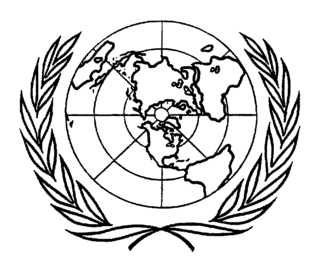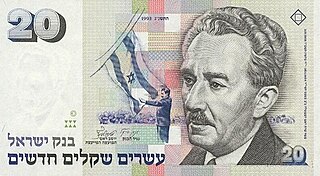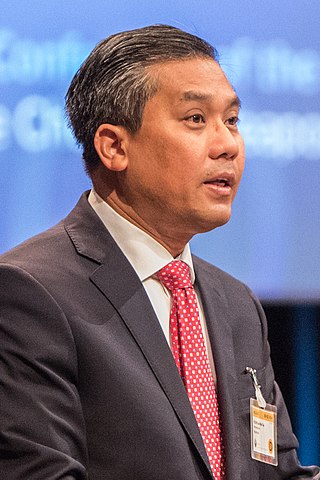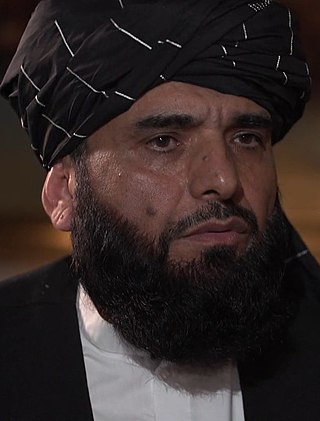
The United Nations General Assembly is one of the six principal organs of the United Nations (UN), serving as the main deliberative, policymaking, and representative organ of the UN. Currently in its 77th session, its powers, composition, functions, and procedures are set out in Chapter IV of the United Nations Charter. The UNGA is responsible for the UN budget, appointing the non-permanent members to the Security Council, appointing the UN secretary-general, receiving reports from other parts of the UN system, and making recommendations through resolutions. It also establishes numerous subsidiary organs to advance or assist in its broad mandate. The UNGA is the only UN organ where all member states have equal representation.

The United Nations Economic and Social Council is one of the six principal organs of the United Nations, responsible for coordinating the economic and social fields of the organization, specifically in regards to the fifteen specialised agencies, the eight functional commissions, and the five regional commissions under its jurisdiction.

The member states of the United Nations comprise 193 sovereign states. The United Nations (UN) is the world's largest intergovernmental organization. All members have equal representation in the UN General Assembly.
China is one of the charter members of the United Nations and is one of five permanent members of its Security Council.

The United Nations General Assembly Resolution 2758 was passed in response to the United Nations General Assembly Resolution 1668 that required any change in China's representation in the UN be determined by a two-thirds vote referring to Article 18 of the UN Charter. The resolution, passed on 25 October 1971, recognized the People's Republic of China (PRC) as "the only legitimate representative of China to the United Nations" and removed "the representatives of Chiang Kai-shek" from the United Nations.

Myanmar is a unitary republic, with elected representatives at the national state or region levels. On the national level, the president who is the head of state and legislature, is elected indirectly through an Electoral College. According to the 2008 constitution, the term durations of the President, and Cabinet are five years. All elections are regulated by the Union Election Commission.
The United Nations General Assembly has granted observer status to international organizations, entities, and non-member states, to enable them to participate in the work of the United Nations General Assembly, though with limitations. The General Assembly determines the privileges it will grant to each observer, beyond those laid down in a 1986 Conference on treaties between states and international organizations. Exceptionally, the European Union (EU) was in 2011 granted the right to speak in debates, to submit proposals and amendments, the right of reply, to raise points of order and to circulate documents, etc. As of May 2011, the EU is the only international organization to hold these enhanced rights, which has been likened to the rights of full membership, short of the right to vote.

The United Nations Regional Groups are the geopolitical regional groups of member states of the United Nations. Originally, the UN member states were unofficially organized into five groups as an informal means of sharing the distribution of posts for General Assembly committees. Now this grouping has taken on a much more expansive and official role. Many UN bodies are allocated on the basis of geographical representation. Top leadership positions, including Secretary-General and President of the General Assembly, are rotated among the regional groups. The groups also coordinate substantive policy and form common fronts for negotiations and bloc voting.

The United Nations Conference on International Organization (UNCIO), commonly known as the San Francisco Conference, was a convention of delegates from 50 Allied nations that took place from 25 April 1945 to 26 June 1945 in San Francisco, California, United States. At this convention, the delegates reviewed and rewrote the Dumbarton Oaks agreements of the previous year. The convention resulted in the creation of the United Nations Charter, which was opened for signature on 26 June, the last day of the conference. The conference was held at various locations, primarily the War Memorial Opera House, with the Charter being signed on 26 June at the Herbst Theatre in the Veterans Building, part of the Civic Center. A square adjacent to the Civic Center, called "UN Plaza", commemorates the conference.

United Nations General Assembly Resolution 273 was adopted on May 11, 1949, during the second part of the third session of the United Nations General Assembly, to admit the State of Israel to membership in the United Nations. It was passed following the approval of UN Security Council Resolution 69 on March 4, 1949.

Abdul Zahir Tanin is an Afghan diplomat who has served as the Special Representative of the Secretary-General for Kosovo, making him Head of the UN Interim Administration Mission in Kosovo (UNMIK), since October 2015.
The Union Election Commission is the national level electoral commission of Myanmar (Burma), responsible for organising and overseeing elections in Burma, as well as vetting parliamentary candidates and political parties.

The 70th Session of the United Nations General Assembly opened on 15 September 2015. The President of the United Nations General Assembly was from the Western European and Others Group.
Afghanistan officially joined the United Nations on 19 November 1946 as the Kingdom of Afghanistan. In June 1945, the month after war had ended in Europe, representatives from 50 countries came together and drew up the UN Charter, which was signed on 26 June 1945. The UN officially came into existence on 24 October 1945.
The Special Envoy of the Secretary-General on Myanmar is a special Representative of the Secretary-General of the United Nations created in 2018 to respond to the Rohingya genocide starting in August 2017 and its effects in Myanmar. According to the mandate established by the UN General Assembly in its resolution 72/248 in 2017, the Special Envoy "works in close partnership with all stakeholders including local communities and civil society, and regional partners, notably the Government of Bangladesh and the Association of Southeast Asian Nations (ASEAN), regional countries, and the broader membership of the United Nations."

Kyaw Moe Tun is a Burmese diplomat who currently serves as the Permanent Representative of Myanmar to the United Nations. Prior to his appointment to UN, he had served as director-general of International Organizations and Economic Development Department under the Ministry of Foreign Affairs from 2016 to 2018.

Muhammad Suhail Shaheen is a Taliban member who is currently the head of the Political Office in Doha. He edited the English-language, state-owned Afghan newspaper The Kabul Times during the first Islamic Emirate of Afghanistan (1996–2001), before being appointed to Afghanistan's Embassy in Pakistan as a deputy ambassador.

The Seventy-sixth session of the United Nations General Assembly was the session of the United Nations General Assembly which ran from 14 September 2021 to 13 September 2022. The President of the UN General Assembly is from Asia-Pacific Group.
The Taliban has ruled Afghanistan as the Islamic Emirate of Afghanistan since taking control by force in 2021, overthrowing the internationally recognized Islamic Republic of Afghanistan. The takeover was widely criticized by the international community, and no countries have extended diplomatic recognition to the new regime, despite nominally maintaining relations with Afghanistan. The Taliban has aggressively campaigned for international recognition since the takeover. Several countries have vowed never to recognize the Islamic Emirate, and others have said they will do so only if human rights in the country are respected. Some countries have accredited Taliban diplomats at the chargé d'affaires level despite not recognizing the Islamic Emirate.
 The Bahamas
The Bahamas  Bhutan
Bhutan  Chile
Chile  China (permanent member)
China (permanent member) Namibia
Namibia  Russia (permanent member)
Russia (permanent member) Sierra Leone
Sierra Leone  Sweden
Sweden  United States (permanent member)
United States (permanent member)











